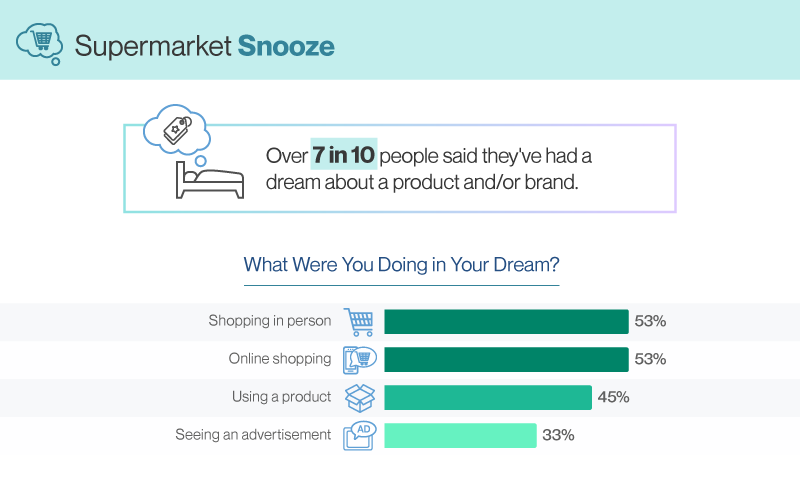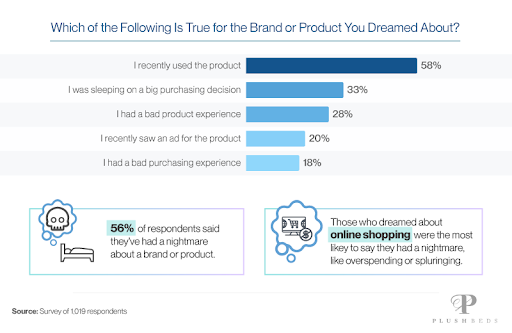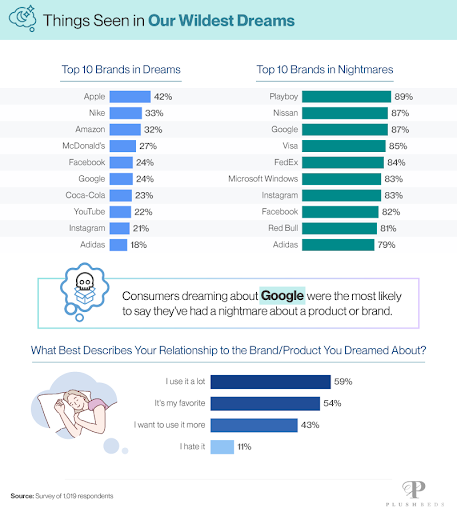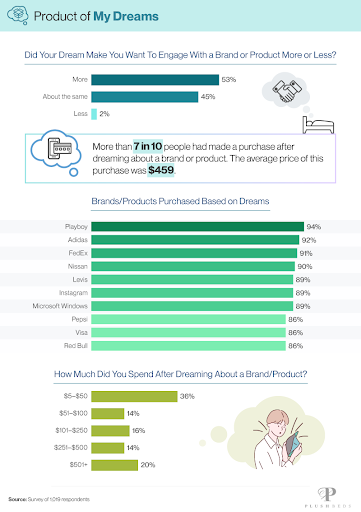Dreaming is a phenomenon that humans are endlessly fascinated with. We know quite a lot about dreams from a scientific perspective, but there’s also so much that we’re still learning. One of the most intriguing aspects of a dream is the often random and inexplicable appearance of a person or item that we either know well or not at all.
We’ve all had those dreams, and many of us have also dreamed of products or brands that we either use or don’t use regularly. In this age of targeted advertising, especially on social media, seeing something pop up in your dreams that you own or have had marketed to you wouldn’t be incredibly out of the ordinary.
To further explore this phenomenon, PlushBeds conducted a survey of 1,000 people to get an idea of how advertising and marketing impact our dreams, whether respondents ever bought something after dreaming about it, and much more. The survey was made up of people from all generations, and the results were eye-opening, to say the least.
Most notably, 7 in 10 people surveyed for the study said they’d dreamed about a product and/or brand. But what were those people doing, exactly? As it turns out, 53% said they were either shopping in person or online, and 45% said they were using a product. Thirty-three percent said they were just seeing an ad in their dream.
The vast majority of respondents (58%) said they’d just used the product that they dreamed about, while 33% said they were sleeping on a major purchasing decision; 28% said they had a bad product experience; 20% reported recently seeing an ad for the product they dreamed about; and 18% said they had a bad purchasing experience.
When it comes to dreams versus nightmares, it’s easy to assume that many of us have had nightmares about certain products, especially if we had a particularly bad experience with them. In fact, 56% of respondents confirmed having a nightmare about a brand or product. Those who had dreams about online shopping were most likely to have nightmares, often about overspending or splurging on something.
What about the brands people have seen in dreams versus the ones they’ve seen in nightmares? Of course, there isn’t much concrete understanding of the significance or meaning of what we see in our dreams, but many have accepted that there’s some sort of subconscious connection.
“No one has yet determined with exactitude what dreams or the images in dreams mean. That dreams are significant indicators of one’s subconscious mind is a basic assumption in various cultures, but in different ways,” licensed clinical social worker Alan Kuras told CNET in a recent interview.
Is there something to be said for certain brands frequently appearing in dreams and others appearing in nightmares? Quite possibly, and the PlushBeds survey sheds some interesting light on this. Notably, Apple was the top brand that appeared in dreams, with 42% of respondents saying an Apple product has shown up for them. Apple was followed by Nike (33%), Amazon (32%), McDonald’s (27%), and Facebook (24%).
On the nightmare side, Playboy was the top brand that appeared in respondents’ nightmares (89%), followed by Nissan (87%), Google (87%), Visa (85%), and FedEx (84%). Those who dreamed about Google were the most likely to say they’d had a nightmare about a product or brand.
The study didn’t just explore the most common brands or products appearing in people’s dreams, it also posed the question of whether dreaming about something made people want to engage more or less with that thing. Interestingly, 53% said their dream made them want to engage with a product more, while 45% said their interest in a product or brand was about the same after dreaming about it. Just 2% said their dream made them want to engage less with the product or brand.
That said, more than 7 in 10 respondents said they made a purchase after dreaming about a particular brand or product, and the average purchase price was $459.
A lot has been said about media consumption before bed and especially how it impacts our dreams. Studies have shown that media we consume can show up in our dreams and greatly impact the direction or tone of that dream.
“Utilizing social media websites, whether you are simply reading and writing texts, streaming videos, or engaging in other forms of communication available on that platform can stimulate thought, affect your emotions, and ultimately have some impact on dream content,” medical director Marc L. Benton said in an interview with the Courier-Post in 2019. “The same is true with things that are viewed on television or online, in reading books, and just generally the experiences that one may have had during the day – particularly if it impacts what one is thinking about before going to bed.”
That idea was certainly reflected in the PlushBeds study, with 24% saying that consumption of videos was most associated with products or brands appearing in their dreams, while 20% said TV shows, and 18% cited social media. Given that these are the platforms in which we’re most heavily marketed things from brands of all kinds, thanks to targeted marketing, it makes sense that so many have had dreams about products—good or bad.
Ultimately, with digital and social advertising increasing every day and algorithms getting more and more sophisticated, it seems that our dreams will be full of products and brands for years to come. Maybe slowing down our media consumption before bed is the answer, but if you’ve been contemplating that new iPhone or video game console, then chances are you’ll be dreaming of it one way or another.
Read next: The Smartphone Market Just Grew for the First Time in 5 Years
We’ve all had those dreams, and many of us have also dreamed of products or brands that we either use or don’t use regularly. In this age of targeted advertising, especially on social media, seeing something pop up in your dreams that you own or have had marketed to you wouldn’t be incredibly out of the ordinary.
To further explore this phenomenon, PlushBeds conducted a survey of 1,000 people to get an idea of how advertising and marketing impact our dreams, whether respondents ever bought something after dreaming about it, and much more. The survey was made up of people from all generations, and the results were eye-opening, to say the least.
Most notably, 7 in 10 people surveyed for the study said they’d dreamed about a product and/or brand. But what were those people doing, exactly? As it turns out, 53% said they were either shopping in person or online, and 45% said they were using a product. Thirty-three percent said they were just seeing an ad in their dream.
The vast majority of respondents (58%) said they’d just used the product that they dreamed about, while 33% said they were sleeping on a major purchasing decision; 28% said they had a bad product experience; 20% reported recently seeing an ad for the product they dreamed about; and 18% said they had a bad purchasing experience.
When it comes to dreams versus nightmares, it’s easy to assume that many of us have had nightmares about certain products, especially if we had a particularly bad experience with them. In fact, 56% of respondents confirmed having a nightmare about a brand or product. Those who had dreams about online shopping were most likely to have nightmares, often about overspending or splurging on something.
What about the brands people have seen in dreams versus the ones they’ve seen in nightmares? Of course, there isn’t much concrete understanding of the significance or meaning of what we see in our dreams, but many have accepted that there’s some sort of subconscious connection.
“No one has yet determined with exactitude what dreams or the images in dreams mean. That dreams are significant indicators of one’s subconscious mind is a basic assumption in various cultures, but in different ways,” licensed clinical social worker Alan Kuras told CNET in a recent interview.
Is there something to be said for certain brands frequently appearing in dreams and others appearing in nightmares? Quite possibly, and the PlushBeds survey sheds some interesting light on this. Notably, Apple was the top brand that appeared in dreams, with 42% of respondents saying an Apple product has shown up for them. Apple was followed by Nike (33%), Amazon (32%), McDonald’s (27%), and Facebook (24%).
On the nightmare side, Playboy was the top brand that appeared in respondents’ nightmares (89%), followed by Nissan (87%), Google (87%), Visa (85%), and FedEx (84%). Those who dreamed about Google were the most likely to say they’d had a nightmare about a product or brand.
The study didn’t just explore the most common brands or products appearing in people’s dreams, it also posed the question of whether dreaming about something made people want to engage more or less with that thing. Interestingly, 53% said their dream made them want to engage with a product more, while 45% said their interest in a product or brand was about the same after dreaming about it. Just 2% said their dream made them want to engage less with the product or brand.
That said, more than 7 in 10 respondents said they made a purchase after dreaming about a particular brand or product, and the average purchase price was $459.
A lot has been said about media consumption before bed and especially how it impacts our dreams. Studies have shown that media we consume can show up in our dreams and greatly impact the direction or tone of that dream.
“Utilizing social media websites, whether you are simply reading and writing texts, streaming videos, or engaging in other forms of communication available on that platform can stimulate thought, affect your emotions, and ultimately have some impact on dream content,” medical director Marc L. Benton said in an interview with the Courier-Post in 2019. “The same is true with things that are viewed on television or online, in reading books, and just generally the experiences that one may have had during the day – particularly if it impacts what one is thinking about before going to bed.”
That idea was certainly reflected in the PlushBeds study, with 24% saying that consumption of videos was most associated with products or brands appearing in their dreams, while 20% said TV shows, and 18% cited social media. Given that these are the platforms in which we’re most heavily marketed things from brands of all kinds, thanks to targeted marketing, it makes sense that so many have had dreams about products—good or bad.
Ultimately, with digital and social advertising increasing every day and algorithms getting more and more sophisticated, it seems that our dreams will be full of products and brands for years to come. Maybe slowing down our media consumption before bed is the answer, but if you’ve been contemplating that new iPhone or video game console, then chances are you’ll be dreaming of it one way or another.
Read next: The Smartphone Market Just Grew for the First Time in 5 Years





